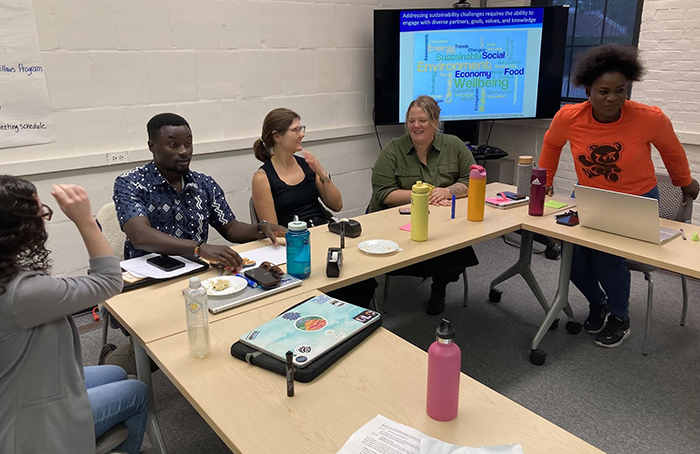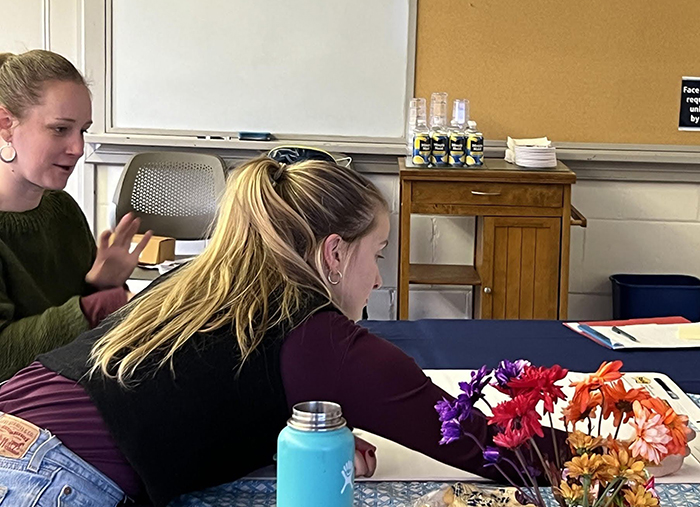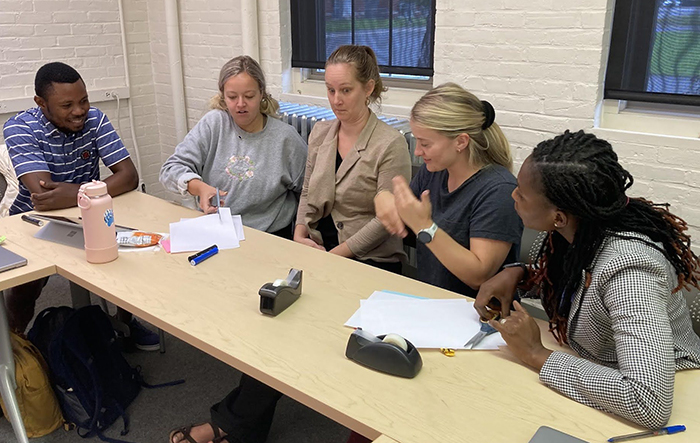Interdisciplinary research met creative collaboration through Mitchell Center’s Sustainability Graduate Fellows program

Story by Sam Schipani
Academic research often happens in silos, confined to specialized departments. Compartmentalizing research can make it more difficult to solve real-world problems, or approach them in new and creative ways.
Through the 2023-2024 academic school year, the University of Maine’s Senator George J. Mitchell Center for Sustainability Solutions hosted an experimental cohort of 11 graduate students across seven different departments for networking, career building workshops, and peer-to-peer learning. This first-of-its-kind project for the university brought together an exceptionally wide range of disciplines, and the results sparked new life into the research of graduate students across academic fields, from computer science to soil science.
Jessica Jansujwicz, research assistant professor in the Department of Wildlife, Fisheries, and Conservation Biology and faculty fellow at the Mitchell Center, said that the idea for the Sustainability Graduate Fellows program came out of long conversations between faculty and students about the vision and mission of the Mitchell Center.
“Faculty across campus and students themselves expressed an interest in learning more about each other’s work and in making connections between departments and disciplines ,” Jansujwicz said. “The Mitchell Center has a long history of bringing folks together whether it’s faculty students or partners to work on really complex sustainability issues; this was a natural fit for this work to grow.”
Finding the fellows

Using a competitive process involving written applications, interviews and a review panel, a diverse group of 11 fellows were chosen from three different UMaine colleges to participate in the newly developed program.
“The fellows all came with many skills and expertise to share, but also an openness and willingness to learn from others,” Jansujwicz said.
Though they shared that open mindedness, the members of the cohort all had different levels of experience with interdisciplinary research — or, for that matter, interaction with the Mitchell Center.
Allison Foster, who was then a masters student in the School of Forest Resources, knew Jansujwicz through the National Science Foundation’s National Research Traineeship Program in Conservation Science. She applied for the fellowship because applied that same interdisciplinary approach to networking and community building.
Tolulope Oyikeke, Ph.D. in Ecology and Environmental Sciences, said that the “prestige and reputation” of the Mitchell Center motivated him to apply, as well as the center’s goals and objectives on finding sustainable solutions to real world problems. Gladys Adu Asieduwaa, Ph.D. Ecology and Environmental Sciences, saw it as an “an excellent opportunity for interdisciplinary learning and professional development.”
Katrina Schweikert, Ph.D. in Spatial Information Science and Engineering, had little interaction with the Mitchell Center prior to the fellowship, but was interested in learning more about how sustainability could be incorporated into her research.
“I work on ontologies, so a lot of that is representing concepts in a way that computers can understand. In order to build these systems that represent other sciences, it’s useful for me to have somebody look and say, ‘Yes, that makes sense, this is how we understand concepts in our discipline,’” Schweikert said.
The fellowship

The Sustainability Graduate Fellows program was structured into two primary parts. In the fall semester, Jansujwicz, Mitchell Center Director David Hart, and other Mitchell Center faculty planned professional development workshops that were determined by the fellows, like facilitation training and interactive exercises to explore team science and collaboration.
Alex Scearce, master’s student in Plant, Soil and Environmental Science, reflected on an activity where the fellows had to work in teams to construct a paper chain without talking to each other and only using one hand.
“It’s kind of funny how different our approaches were to solving problems,” Scearce said. “Some of us put more energy into that on the front end, and some of us put more energy into the push of getting the task done. It was cool to see how both of those strategies work together.”
The fellows also participated in lightning round presentations about their research. Scearce said that presenting about her research to researchers in different disciplines was a useful way to practice communicating.
“A lot of people were asking questions that I wasn’t thinking about given my position as a natural scientist. For science communication it’s really huge to have a group like that to bounce things off of,” Scearce said.
Then, in the spring semester, the fellows presented to their peers based on the skills they had developed throughout their research and previous experience. The presentation ranged from data visualization and nature journaling to values-based habit building and facilitation techniques.
“What really stood out for me was the enthusiasm and passion that they brought to developing and sharing with their peers,” Jansujwicz said. “All the students were so supportive of each other and willing to engage in activities that were new to them and sharing things that weren’t part of their academic world.”
Jansujwicz said they also hosted informal events like potlucks throughout the fellowship to get to know each other, developing community and camaraderie in their cohort.
After the fellowship
At the end of the fellowship, the graduate students who were continuing with their research felt reinvigorated.

“Through the program, I gained a more interdisciplinary understanding of sustainability challenges and solutions. The program also taught me the value of collaboration and communication in addressing complex sustainability issues. The program’s emphasis on problem-solving, critical thinking, and effective communication has been invaluable in my research and academic journey,” Oyikeke said.
Madeline Hunter, Masters in Plant, Soil, and Environmental Science, said that the fellowship reinforced her desire to include farmers’ opinions in her research.
“We talked a lot about including stakeholder voices in research, and I’d love to investigate this further as I continue with my studies. We also had a peer-led workshop on research communication and visual presentation of data that was really helpful,” Hunter said.
Joelle Kilchenmann, Ph.D. in Ecology & Environmental Sciences, said that the fellowship taught her about the similarities between working with farmers and fishers.
“They have this vast knowledge on their topic and approaching them they know more than you and you have to come sort of hat-in-hand. Scientists and farmers have worked together in this specific way much longer than fishermen. If the farmers can do it then maybe we can learn from that when engaging fishermen,” Kilchenmann said.
Some fellows even got specific techniques from their peers. Scearce was able to incorporate models traditionally used in social science for her PFAS research to talk about how much PFAS from the soil transfers to a plant, which she used for a presentation to growers.
“Some of the social scientists in the group were talking about some of the paradigms they use to deal with uncertainty. That inspired me to think about my data in a different way. I think something that was cool was thinking about how things traditionally in the social science field can transfer over,” Scearce said.
Some of the fellows have finished their graduate programs and are moving on to jobs that were informed by the values that were established through the fellowships. Inspired by the fellowship, Foster has taken a role in science communication at the Biodiversity Research Institute.
Christopher Yalley, masters student in global policy, said that the program broadened the way that he views sustainability, and he is looking at how to apply his masters work in economics to non-profit organizations working at the intersection of climate change, sustainability and adaptation.
“Previously, if you were asking me to define sustainability I would definitely go for social and economic…but through this fellowship I have been able to recognize that it goes beyond that,” Yalley said. “I worked doing oil and gas in Ghana and my sustainability indicators were just profit. Through this fellowship I’m going to expand those indicators.”
The fellowship program will not take place in the 2024-2025 academic year as Jansujwicz moves into a full time position with Maine Sea Grant, but Jansujwicz is hoping that a new faculty member will be able to take up the gauntlet in future years.
“I know from coordination and leadership it was one of the most rewarding things of my career to work with those students. I learned a lot from them,” Jansujwicz said.
Contact: Ruth Hallsworth, ruth.hallsworth@maine.edu
